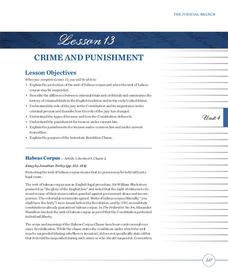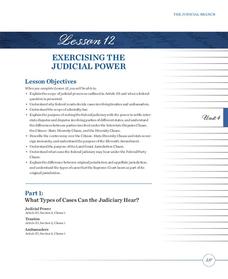Judicial Learning Center
About Federal Judges
Not just anybody can do the job of a federal judge, but according to the United States Constitution just about anybody can be appointed. The lesson outlines the process and requirements for becoming a federal judge, focusing on the...
Judicial Learning Center
The U.S. Supreme Court
How do Supreme Court justices determine which cases to consider? What happens when the Supreme Court decides not to take a case? The lesson explores important questions and others in the field of criminology. It focuses on the appeals...
Judicial Learning Center
Levels of the Federal Courts
The Supreme Court gets all the glory, but very few federal cases make it to the highest court. An interesting lesson explores the structure of the lower levels of the federal court system. In addition to outlining the organization of...
Judicial Learning Center
The Constitution
Supreme Court justices debate the meaning of the US Constitution, but we expect teachers to explain it to scholars with far less training and experience. A daunting task for sure, but it's not insurmountable with resources that simplify...
Judicial Learning Center
Article III and the Courts
What's the best way to make sense of the Constitution? A helpful lesson contains both the text of Article III and annotation of each of its sections, breaking it down into easy-to-understand parts. It also includes links to a glossary...
Judicial Learning Center
The Constitution and Rights
What's the right way to teach young historians about the Bill of Rights? Many an instructor has asked this question when pondering lesson plans over the US Constitution. The Constitution and Rights is a nifty resource that provides a...
Judicial Learning Center
Law and the Rule of Law
We hear a lot about the importance of the rule of law, but most people do not really know what those words mean. The lesson is a webpage that defines the rule of law, explains why it is important in a democratic society and provides...
Judicial Learning Center
The Ratification Debate
Most Americans profess their love for the US Constitution, but this was not always the case. An informative lesson overviews the debate between the Federalists and Anti-Federalists by summarizing the main arguments of each side. It...
Judicial Learning Center
The Judge and the Jury: Trial by Jury
Why is it so important to have a trial by jury in the American judicial system? This right is one of the hallmarks of American democracy, but it also comes with the responsibility of serving on a jury if called. Young legal scholars...
Judicial Learning Center
Judicial Independence: What’s Wrong with This Court?
Why is it important for judges to operate independently of politics or other branches of government? Scholars ponder the question as they examine video clips, case studies, excerpts of the US Constitution, and an interactive computer...
Judicial Learning Center
Understanding the Types of Cases
Most young scholars are aware of the criminal courts system, but the United States Constitution allows for a much broader role. What other roles do courts play in settling other questions? A case study and WebQuest-style activities...
National Constitution Center
The Development and Application of the First Amendment
What are the limits on freedom of speech? While a cherished right in the Constitution, it is not unbridled. Budding historians consider what checks should exist on this liberty using news stories, court cases, and College Board prompts.
National Constitution Center
Federalism, the Commerce Clause, and the Tenth Amendment
How do the state and federal governments relate to each other? The Constitution has a lot to say about that! Using an interactive online tool, pupils explore the Tenth Amendment. They apply their knowledge to political cartoons and news...
National Constitution Center
Voting Rights since the Fifteenth Amendment
What does it mean to have the right to vote? To what extent have interpretations of the Fifteenth Amendment changed over time? Young historians examine and analyze primary source documents, an interactive website, and historical analysis...
Judicial Learning Center
About Federal Judges: Qualifications of Judges
"Help Wanted: A Supreme Court Justice." What should be included in the ad? Learners ponder the question during a lively activity that asks them to examine the qualifications for various federal offices and then create job postings....
iCivics
Mini-Lesson: Presidential Succession
Who is in line for the presidency? Learners research the line of succession in the executive branch. They analyze the role the cabinet plays in a situation where the president and vice president are not able to serve. Along the way,...
Ashbrook Center at Ashland University
Ratification of the Constitution
How difficult was it to get everyone to agree on the contents of the Constitution? Historians analyze the task of the Founding Fathers in creating the United States Constitution. They research a directory of video clips, primary sources,...
Ashbrook Center at Ashland University
The Constitutional Convention
Imagine sitting down with representatives of your school to write a new student handbook. What arguments would ensue? How would compromises be made to finish the project? Scholars research the Constitutional Convention using a directory...
Law Focused Education
Federalist — Anti-Federalist
Deciding how to rule a nation is no easy task. Scholars use an online quiz to test their knowledge of Federalist and Anti-Federalist positions, ideas on the Articles of Confederation, and finish with questions on the United States...
Judicial Learning Center
Separation of Powers/Qualifications of Office
Time to work together in class to understand the separation of powers as well as the qualifications for office! The resource includes terms to review for pre-knowledge before beginning instruction. Following the review, pupils work on a...
Newspaper Association of America
Game On: Constitution Activities for Elementary through High School
Who would've guessed that a document written over 200 years ago would still have a lot to teach us today? A set of folder games incorporates parts of a newspaper to teach about the Constitution and how it still applies to life today. The...
National Endowment for the Humanities
The Preamble to the Constitution: A Close Reading Lesson
"We the people of the United States, in order to form a more perfect union..." These familiar lines begin the Preamble to the Constitution, but do learners know what they mean? A close reading exercise takes a look at the language of the...
Heritage Foundation
Crime and Punishment
You wouldn't give someone a 10-day timeout for eating a piece of candy. The US government, too, does not believe in unreasonable punishment. A variety of exercises exploring the clauses of the US Constitution prompts class members to...
Heritage Foundation
Exercising Judicial Power
We should all do more exercising, but should the judicial branch as well? High schoolers develop their understanding of what powers the judicial branch carries because of the US Constitution, as well as where their limits lie in the...

























